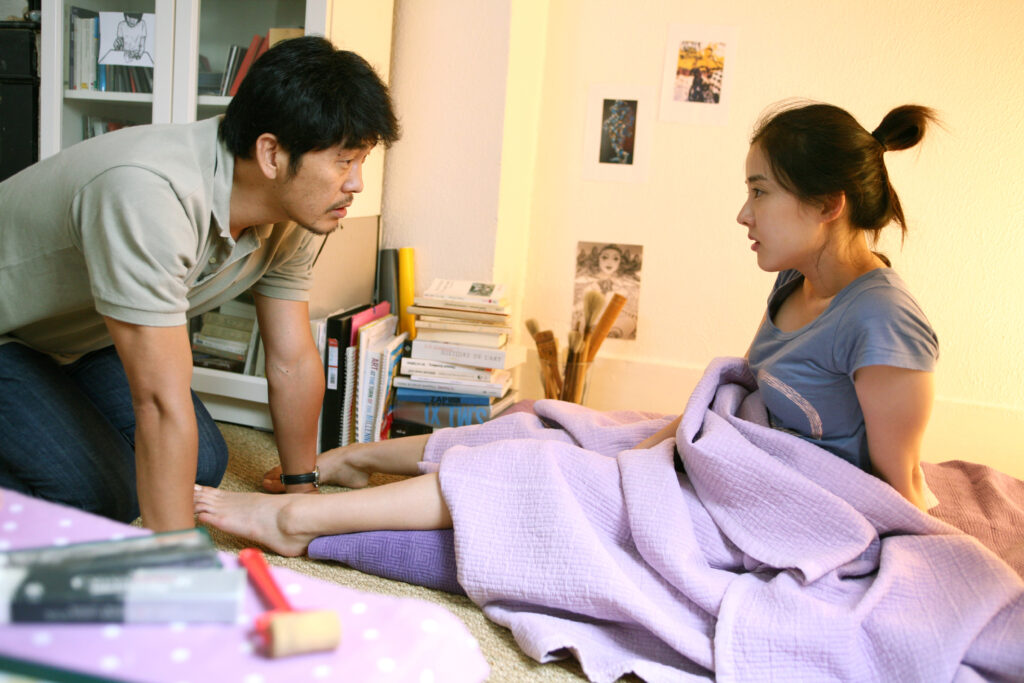Hong Sang-soo’s 2009 film Night and Day marks many firsts for the director, including his first film shot on digital and his first to be filmed outside his native South Korea. At 144 minutes, Night and Day is also Hong’s longest film by a considerable distance. That doesn’t mean that Night and Day is a radical departure for the filmmaker; it is, as with many of his films before it and many since, a merciless dissection of a self-absorbed male artist’s fragile ego as refracted through his troubled relationships with women. Setting the film outside of his usual geographical comfort zone, however, does put Hong in a more exploratory mindset than in his previous work. Instead of just the usual zooms in the middle of conversations, Hong’s camera here (cinematography by Kim Hoon-kwang) tends to rove around, taking in random bits of imagery — a bird fallen out of its nest here, a small river of runoff there — before focusing on the characters of a scene. These seemingly extraneous moments and camera movements are actually perfectly in sync with the restlessness of Night and Day’s lead character, Seong-nam (Kim Yeong-ho) — a painter who has just fled Seoul after being caught smoking marijuana in public and who is now hiding-out in Paris in order to avoid being arrested. Seong-nam has had to temporarily separate from his wife (Hwang Su-jeong)…but that doesn’t stop him from considering sleeping with, and sleeping with, various fellow Korean female expats, including his old flame, Min-seon (Kim Yu-jin); an art student named Hyeon-ju (Seo Min-jeong); and Hyeon-ju’s temperamental roommate, Yu-jeong (Park Eun-hye).
It’s the theme of forgiveness here, in particular, that may be considered the freshest addition to Hong’s approach up to this point.
That’s about as far as plot goes for Night and Day. But as ever with Hong, the drama, such as it is, lies in his close observation of his protagonist’s every flicker of depressed, needy, self-loathing desire for love; for companionship; for a settled family life; and even, to some degree, for forgiveness. It’s the theme of forgiveness here, in particular, that may be considered the freshest addition to Hong’s approach up to this point. With Seong-nam reciting Bible verses to Min-seon in order to justify not sleeping with her, and with occasional images of the painter reading the Bible and sitting in church, Night and Day adds a layer of spiritual yearning to an otherwise mundane chronicle of a man struggling with his macho urges. So, in a sense, the film amounts to Hong’s take on Martin Scorsese’s studies of male guilt. Seong-nam, in his own quiet way, isn’t that much different from Raging Bull‘s Jake La Motta — a man who constantly flirts with falling into a moral abyss, who can’t help but sin. Maybe it’s no accident that one of the climactic images of Night and Day is of a hog repeatedly ramming its face into the window of a public bath while Seong-nam’s wife sobs in the tub. The soothing canvases of clouds that Seong-nam paints are ultimately a front for the artist’s own roiling inner life of rampant sexual desire and guilt. If anything, Night and Day‘s deliberately repetitive narrative and excessive length only serve to accentuate, underneath the droll surface, just how damning the film is toward its protagonist.


Comments are closed.